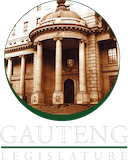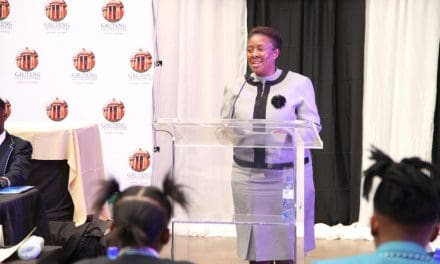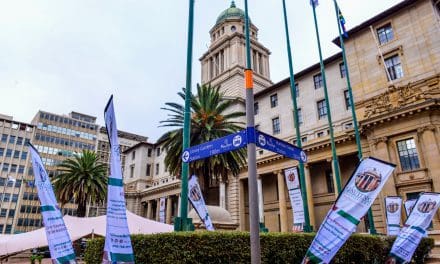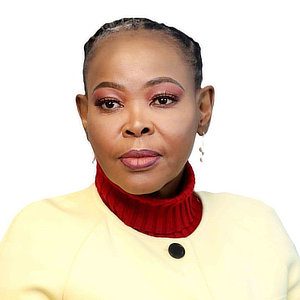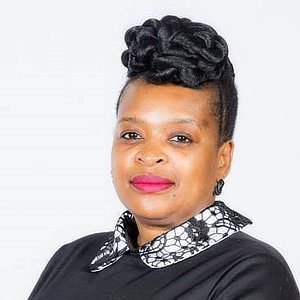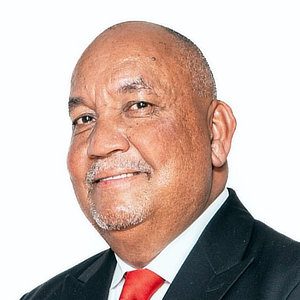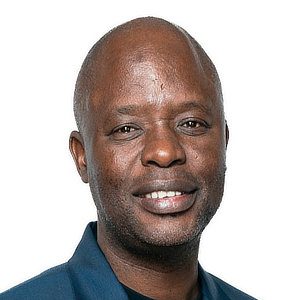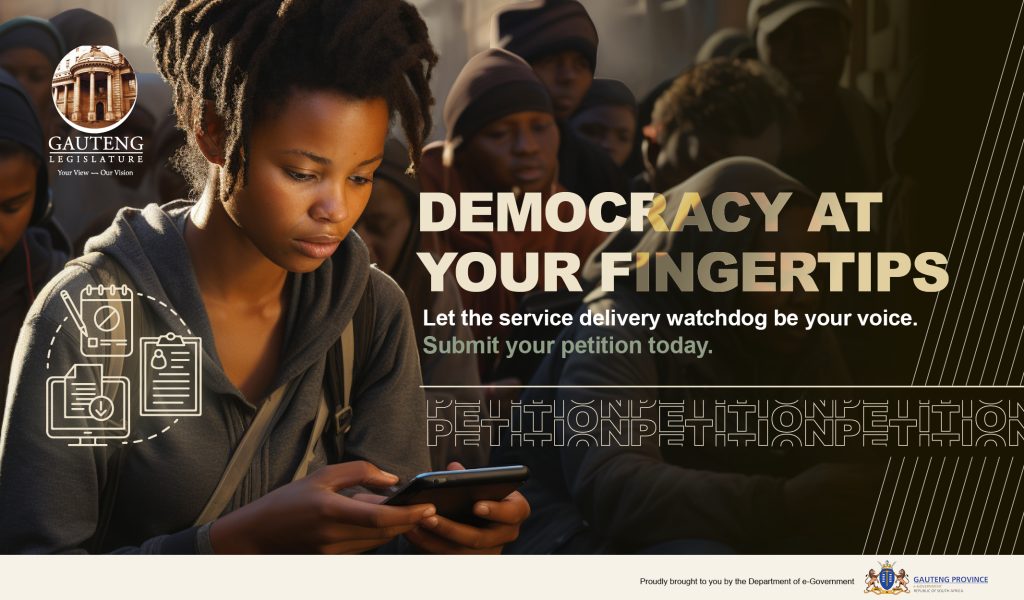Presentation by the Speaker of the Gauteng Provincial Legislature, Honourable Lentheng Ntombi Mekgwe, at the Presentation of the Budget (Provincial Budget Vote 2) to the Gauteng Provincial Legislature.
Speech by the Speaker of the
Gauteng Provincial Legislature
Deputy Speaker, Honourable Nomvuyo Mhlakaza-Manamela
Chairperson of Committees, Honourable Sizakele Nkosi-Malobane
Deputy Chairperson of Committees, Honourable Mpapa Kanyane
Premier of Gauteng, Honourable David Makhura
Leaders of Political Parties represented in the Legislature
Members of the Legislature
Distinguished Guests
People of Gauteng
It is indeed an honour and a privilege to stand before you today in this august House as I present the Gauteng Provincial Legislature Budget Vote 2 to you, the People of Gauteng.
Let me start by congratulating all Honourable Members for being elected to represent the interest of the people following the resoundingly successful May 8 Elections. we must express our sincerest appreciation to all citizens who braved cold and rain to exercise their hard-won democratic rights to vote. Their vote places huge responsibility on all us, irrespective of party affiliation, to ensure their confidence in democracy is not in vain. We owe it to the people as a whole to work hard as a collective to ensure that their aspiration and dreams are realised.
In this regard, we must be true to the words of our founding Father, uTata Nelson Mandela who, in his inauguration speech in 1994, said the following “We have triumphed in the effort to implant hope in the breasts of the million of our people. We enter into a covenant that we shall build the society in which all South Africans, both black and white, will be able to walk tall, without any fear in their hearts, assured of their inalienable right to human dignity – a rainbow nation at peace with itself and the world”.
A special thank you to the Independent Electoral Commission (IEC) for running yet another successful elections which were heralded by the world as free and fair. We express our deepest appreciation to the Board, Chief Electoral Officer, Mr Simon Mamabolo and his team of professionals for making our country proud – especially in the context of challenges toward electoral results in the world have become a common phenomenon.
The 6th Term of the Legislature coincided with the celebration of 25 years of our democratic breakthrough. These celebrations provide us an opportunity to reflect on the progress made and the challenges that still persist, especially focusing on the Legislative Sector. As we reflect, it will become apparent that the Gauteng Legislature has always been a trailblazer and contributed immensely to the developments on oversight in the country. As part of the initiative to strengthen oversight, the Legislature adopted Manual of Procedures for Ministerial Accountability, Programme Evaluation and Budget Analysis (PEBA), established OCPOL and Legislature Services Board (LSB). we will come back to these developments.
Honourable Deputy Speaker and Members, of the three organs of the State, the place of primacy is generally considered to belong to the Legislature. The function of government begins by law-making and is followed up by law-enforcement and adjudication functions. As such, the legislature is the preeminent organ of the state.
The Legislature is that organ which passes the laws of the government. It is the agency which has the responsibility to formulate the will of the state and vest it with legal authority and force. In simple words, the legislature is that organ which formulates laws. Legislature enjoys a very special and important place in every democratic state. It is the assembly of the elected representatives of the people and represents public opinion and power of the people.
As deliberative assemblies, the Legislatures have a crucial role to reflect the public opinion over various issues. These deliberations have to be conducted in a manner that reflects the decorum of the House based on the Constitution of the Republic, Standing Rules, legislative practices and precedents drawn from other Legislatures in the world – the have to conducted in a manner that provides space and models robust conversations, and a repository of moral courage.
The Legislature must become a mirror through which people can see their interests represented and advanced. In this regard, all elected public representatives have a crucial role foster public trust and confidence in our democracy. Our conduct in the House must demonstrate our seriousness and commitment to improve the quality of life of all our people. It is important that civility governs all our interaction in Committees, the House and in public.
LAW-MAKING
In ancient times, laws used to be either derived from customs, traditions and religious scriptures, or were issued by the kings as their commands. However, in the contemporary era of democracy, legislature is the chief source of law. It is the legislature which formulates the will of the state into laws and gives it a legal character. Legislature transforms the demands of the people into authoritative laws/statutes.
In this regard, the Constitution empowers the Legislature to facilitate law-making by considering, passing, amending or rejecting any Bill before the Legislature, including initiating legislation.
Although GPL has made tremendous strides in fulfilling ensuring that laws are responsive to the needs of the people of Gauteng, there is ample room for improvement. In this regard, Committees will strengthen oversight on implementation of laws, identify gaps which hamper efficient service delivery and where necessary, propose amendments.
We will also improve public education and preparations for public hearings by identifying relevant stakeholders for each hearing, simplify documents and avail documents in relevant languages.
GPL was far ahead of its peers in South Africa by adopting the Legislature Services Act (LSA) in 1996. The Act established the Board, chaired by the Speaker, with responsibilities to, inter-alia:
Determine the size and organisation of the fixed establishment;
Determine the services to be provided by the (Management Service and establish the necessary structures for the provision of the said services;
Institute departments for the Service and increase or reduce the number of departments and organise them into sections and subsections.
We are in the process of assessing if the Act has been superseded by Financial Management of Parliament and Provincial Legislatures Act (FAMPPLA), and if that is the case, what mechanisms may need to be put in place to provide advisory support to the Executive Authority as the Chairperson of LSB.
In 2018/2019 financial year, Legislature achieved an important milestone to strengthen oversight and ensure compliance with Section 120 of the Constitution by enacting Money Bills Amendment Procedure and Related Matters Bill. Mechanisms to implement the Act are being developed.
As Members may be aware, the Constitution provides that provincial legislatures consist of between 30 and 80 members based on the province’s population with the formula thereof determined in terms of the Electoral Act, 73 of 1998. The said determination was conducted at the time of the enactment of the Electoral Act around 1998-1999 and Gauteng province was allocated 73 members based on the population of the province at the time.
In 2018 the House resolved to establish an Ad-Hoc Committee to amend the Electoral Act ensure that Gauteng is representative in terms of the prescripts of the Constitution. Although there was great enthusiasm from the Speakers’ Forum, it is disappointing that that energy did not yield positive results. As a result, GPL is in consultation with Permanent Delegates to the National Council of Provinces to initiate the process to amend the Act. Ongoing progress will be provided to the House.
There is a need to review the Political Party Funding Act to ensure compliance with Political Party Funding Act No. 6 of 2018, and consider developing internal mechanisms to support political parties without negatively affecting the support provided to parties.
Based on the sterling work conducted by our Privileges and Ethics Committee, the Speakers’ Forum resolved that a GPL lead the process towards the enactment of national Ethics and Integrity legislation. The idea of a national legislation is to standardise the approach towards ethics and integrity within the Legislative Sector.
We are glad to announce that research work is currently underway towards this initiative. Last year, GPL hosted a Seminar as part of consultation towards the national legislation, and Administration Team has engaged with other Legislatures to establish how are institutions addressing issues of ethics and integrity.
OVERSIGHT, SCRUTINY AND ACCOUNTABILITY
Oversight can be viewed in terms of what legislatures and their members do. This involves reviewing, monitoring and supervising the executive and the programmes, activities and policy implementation of other organs of state.
According to SOM, oversight is defined as “proactive interaction initiated by a Legislature with the executive and administrative organs …that encourages compliance with the constitutional obligation on the Executive and administration to ensure delivery on agreed-to objectives for the achievement of government priorities”.
Accountability refers to institutionalized practices of giving an account of how assigned responsibilities are carried out.” Accountability simply means that those in power must be held accountable for their acts, omissions and decisions, including those affecting expenditures or policies.
The function of oversight within the South African Legislative Sector context entails:
To detect and prevent abuse, arbitrary behavior, or illegal and unconstitutional conduct on the part of the government and public agencies;
Hold the government to account in respect of how taxpayers’ money is used;
Ensure that policies announced by the government and authorized by Parliament are implemented; and
Improve the transparency of government operations, thereby enhancing public trust in government which, in itself, is a prerequisite for effective policy delivery.
As alluded to earlier, GPL has always been trailblazing in developing mechanisms to improve oversight. One of these earlier initiative was the development of Manual of Procedures for Ministerial Accountability. The Ministerial Accountability was giving substance to the constitutional requirement and aimed at:
To ensure the effective accountability by the Executive Council to the Legislature in terms of House resolutions, questions etc.;
To provide a clear definition of administrative and political accountability as it obtains within the functions of the Executive Council; and
To foster a more robust regime on accountability by the Executive Council.
We are proud that today as we speak, PEBA has been accepted by the South African Legislative Sector (SALS) as the oversight mechanism to be used by all Legislatures – it is now referred to as Sector Oversight Model (SOM). Interest in SOM has also been expressed by other Legislatures in the Continent.
Another initiative led by GPL is the Committees Oversight and Accountability Framework (COVAC) – already SALS have expressed a desire to utilise COVAC. COVAC is framework developed by GPL, consisting of templates and formats to practically guide Oversight and Accountability by the Committees, thereby:
Giving effect to and contextualize the SOM for the GPL;
Guiding the practical (day to day) implementation of SOM; and
Packaging the contextualized installation of the SOM for implementation by the GPG Executive.
The focus areas of COVAC include, strategic compliance, technical compliance and quality, budget oversight, public involvement/ participation, resolution management performance verification and implications on law making and policy (oversight on implementation of laws).
In the years ahead, GPL will continue to improve oversight on the Executive by strengthening oversight tools, improving the skills and knowledge of Members and support staff, partnering with the people, Institutions Supporting Democracy (ISD), research and institutions of higher learning to improve independent verification of information provided by the Executive.
A ground-breaking initiative we will continue with is the Standardization of Performance Information in Gauteng. This will see that all planning and reporting in the province is conducted in an integrated and standardized manner with the GPL as the nerve centre of all oversight in the Province
PUBLIC INVOLVEMENT/ PARTICIPATION
A key element of our democratic system is the involvement of the people in decisions affecting their lives. This is based on the fact that, as the Reconstruction and Development Programme stated “our people, with their aspirations and collective determination, are our most important resource… Development is not about the delivery of goods to a passive citizenry – it is about active involvement and growing empowerment”. This approach is further confirmed by the motto of GPL “Your View – Our Vision”.
In this regard, GPL has developed several mechanisms to involve the people in its processes. Whilst progress has been made in some of these mechanisms, a lot more still needs to be done. These improvements will be guided amongst others, by the Perception Survey and different studies that GPL undertook in the 5th Term as part of Re-engineering Public Participation Project.
These improvements will focus on the following:
Improve systems, processes and capacity to speed up the Petitions turnaround (including a creating a portal shared between Office of the Premier, Office of Public Protector and Human Rights Commission to minimise duplication of petitions;
Scheduling more meetings for Petitions Standing Committee to expedite the number of petitions processed;
Review the Petitions Act to give it more teeth to address non-responsiveness;
Committees to drive Sector Parliaments;
Improve public education, voter education and registration by partnering with other State institutions, community based organisations and non-governmental organisations;
Improve the profile of GPL through taking Committees to the people, print, electronic and social media and partnering with Community media (radio and print).
As alluded earlier, GPL is an active participant in the SALS. SALS is a national forum that brings together Speakers, Deputy Speakers and Secretaries of Legislatures. The main purpose of SALS is to improve inter-legislature relations by developing norms and standards and sharing legislative and administrative experiences. GPL will continue to contribute and learn from experiences with other Legislatures in the country, the Continent and rest of the world (through Commonwealth Parliamentary Association (CPA) and other mechanisms such as National Conference of State Legislatures (NCSL) based in the United States of America (USA).
Through our international collaboration, GPL have, on behalf of the CPA branches in the African Continent and supported by other progressive branches in the Caribbean, Asia, Americas and Atlantic; India; Pacific, and South-East Asia, led a motion for amending the status of CPA from charity to international organisation as the starting point towards transformation of CPA
Building on the foundation built in the 5th Term, GPL will continue to strengthen relationship with Local Municipalities through the Gauteng Speakers’ Forum (GSF) as well as the Municipal Public Accounts Committees (MPACs). The South African Local Government Association (SALGA) also plays an integral part in ensuring coordination and collaboration through the GSF and signed Memorandum of Understanding (MOU).
GPL conducts various women’s empowerment projects, including outreach programmes and initiatives such as the Annual Vita Basadi Awards. Through these awards, the Legislature honours women who conduct community service initiatives from their personal resources. To encourage community service and promote socio-economic progress, the Legislature awards the winners with privately sponsored cash prizes. These awards are intended to encourage women to be independent and savvy on matters of self-empowerment to foster self-sufficiency.
In 2015, the GPL revived the Multi-Party Women’s Caucus (MPWC), a structure that constitutes women legislators from across party lines, which drives the transformation agenda in the institution. The MPWC was nominated for the National Gender Mainstreaming Awards in 2017 and again in 2018; and was recognised for two Awards under the categories of Equal Representation and Participation and Mainstreaming Human Rights. These initiatives proved effective in profiling the MPWC as a massive scale.
The initiatives also opened a potential for Public Private Partnerships (PPP) for MPWC as well as profiling of the MPWC. As a result, the MPWC was profiled in the Sunday Times’ 5th Edition of Celebrating Women Magazine.
OFFICE SPACE
The Legislature is facing serious space challenges leading to high costs of leasing and meetings taking place at commercial venues. Currently GPL is leasing several floors at SAGE Building to accommodate staff. An attempt to purchase the Old Mutual Building was not successful – this necessitated extending the lease at SAGE. The challenge is that, whilst the extension has been granted, there is always a looming risk that the building may be sold. This requires consideration of various options that may be available of building new office space on Harry Hofmeyer and/or continue to look for existing buildings which can accommodate the Legislature.
Currently GPL has an agreement with Gauteng Infrastructure Financing Agency (GIFA) to undertake feasibility studies at Harry Hofmeyer. We are grateful for a commitment of about R8 million from GIFA. We will work with GIFA to expedite the process for the conclusion of the feasibility studies, and continue to explore other possible options which may arise.
MODERNISING THE LEGISLATURE (ICT)
Administratively, we are leading the pack because the GPL is the first Legislature to adopt the cloud-based Information and Communication Technology (ICT) that drives innovation, increases compliance and reduces ICT costs.
As such, the GPL’s innovation in utilising cloud technology to reduce ICT infrastructure costs was recognised and published by Microsoft as a customer success story. Further efforts to modernise the GPL business processes include enhancement of compliance to staff and Members’ declaration of interest process and strengthened protection of GPL data against cybersecurity risks. One of the major achievements of enhancing GPL business processes is the development of the House-Sitting Information Portal.
ADMINISTRATION
The GPL is cognisant of the fact that leadership, education and development of human resources is important in order to achieve higher levels of organisational performance. The institution will thus continue to reduce barriers to learning by promoting learning and growth across the institution.
We are very grateful to the many professionals who work hard and diligently to support elected public representatives to enable them to fulfil their constitutional mandate. To all of them we, thank you.
We know that sometimes you work under very difficult conditions as we push harder to improve our performance. We are also aware that there have been many findings and recommendations seeking to improve your working conditions. Management has reassured us that all the previous findings and recommendations will be integrated into the 2019/2024 strategy, identifying short, medium and long-term strategies to ensure an integrated approach.
Process of procuring obsolete laptops is being expedited through engagement with State Information Technology Agency (SITA).
IMPROVING RELATIONS BETWEEN MANAGEMENT AND ORGANISED LABOUR
Maintaining a strong employer and employee relationship can be the key to the ultimate success of an organisation, the results are advantageous. It is known that if a strong relationship is in place employees will be more productive, more efficient, create less conflict and will be more loyal.
Having strong employer and employee relations will reap a lot of benefits for your institution, which include, improved employee motivation and productivity, employee loyalty and reduction in conflict.
Whilst we appreciate the existence of Gauteng Legislature Labour Forum (GLLF) and its operations, we are also aware that there are tensions between Management and Organised Labour, essentially attributable to unresolved salary negotiations, dispute related to prior year IPMS bonuses for some categories of staff, incomplete process to finalise performance bonuses for Senior Management, amongst other things. As Presiding Officers, we will continue to engage with Management and NEHAWU to expedite the resolution of the root causes of tension.
The Legislature has over the years grappled with the issue of insourcing/outsourcing of security services. A decision to insource was always complicated by the fact that it would have severe financial implications, considering the initial capital outlay and space challenges.
However, cautious of the challenges referred to above and recognising the potential of outsourcing to create exploitative conditions of service for workers, Presiding Officers have decided to employ security officers at GPL. Management will present a plan on how this process will unfold, including space and financial implication.
Hon. Deputy Speaker, Members and the People of Gauteng
The 2019/20 budget was informed by GPL 2014-2019 Strategic Plan. The Strategy has 6 Pillars, i.e.:
• Pillar 1: Transformation of the Legislature’s governance processes.
• Pillar 2: Modernisation of the legislature business of oversight, public participation and law-making practices..
• Pillar 3: Re-engineered public participation beyond slogans.
• Pillar 4: Transformation of the legislative sector in the context of integrated global city region and connected government.
• Pillar 5: Transformation of the legislature’s law-making processes.
• Pillar 6: Consolidating the Legislature’s oversight practices.
The budget has increased by 6% – from R751. 8 million to R761.4 million, and is divided across 5 Programmes as follows:
Programme 1 (Leadership and Governance: Office of the Speaker) R45.6 million;
Programme 2 (Leadership and Governance: Office of the Secretary) R25.2 million
Programme 3 (Corporate Support Services) R355.1 million
Programme 4 (Core Business) R275 million
Programme 5 (Office of CFO) R60.3 million
A brief summary per economic classification reflects that:
Compensation for employees is at 50.2%;
Good and services 32.4%
Transfers to political parties 16.6%
Based on the above, it is apparent that capital expenditure continues to be squeezed, and this may not be sustainable for maintenance of aged heritage site, and compensation of employees must be cautiously managed and measures to improve value for money improved to ensure sustainability of the institution.
Hon. Deputy Speaker and Members
Let me thank all professionals who enable us as Members to do our work efficiently and effectively: our dedicated Legislature staff, and the management.
In the spirit of selfless service delivery, despite our notable achievements, we will never rest in complacency. Rather, we will push harder and increase our endeavours in the relentless pursuit of a robust and focused oversight, meaningful public participation, responsive law-making, and purpose-driven inter-legislature relations and cooperative governance..
As we start the 6th Term of the Legislature, may we conduct our oversight and accountability in a manner that we can be able to look back with pride and echo the words of former President Mandela in his last speech to Parliament on 26 March 1999, “It is here that oversight of government has been exercised … It is here that our society in all its formations has had an opportunity to influence policy and its implementation. …Questions have been raised, we know, as to whether this House is not a carriage on the gravy train, whose passengers idle away their time at the nation’s expense. To those who raise such questions we say: Look at the record of our Parliament during these first years of freedom …it has been a profound privilege to be accountable to this Parliament”. May our actions speak for themselves.
I present budget Vote 2 for your consideration and support.
I THANK YOU
